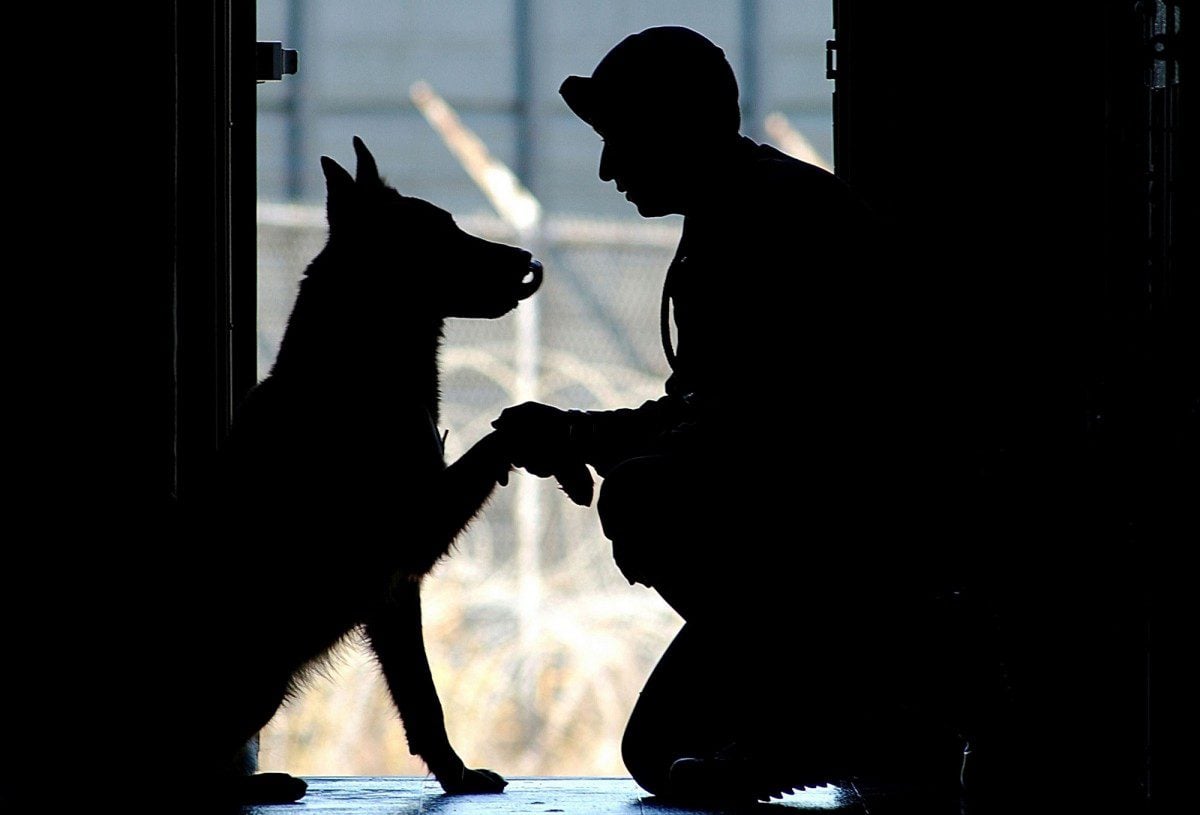Service dogs perform invaluable services for individuals with disabilities every day, and certain physical or psychiatric conditions are greatly improved by the helpful presence of a service dog. If you are considering adding a service dog to your life, you likely have some questions and concerns.
Our guide tells you the basics about service dogs and gives you advice on the most popular service dog breeds.
Do Service Animals Have to Be Dogs?
According to the Americans with Disabilities Act (ADA), the category of service animals is reserved for dogs and miniature horses. Due to their excellent service characteristics, gentle demeanors, and their relatively easy care needs, dogs are the most common type of legally protected service animal.
As official service animals, service dogs are granted a number of rights by federal, state, and local county laws. Miniature horses that provide help for disabled individuals also come with rights, though these protections are not as extensively legally detailed as with dogs. Because of their size, miniature horses may not be allowed in all places that a dog would be allowed, but they are subject to similar regulations.
It’s important to note that other animals can be therapy animals and emotional support animals, but they are not given the same legal protection as a service animal that helps its handler perform complex disability-related tasks.
What Kind of Dogs Are Allowed to Be Service Dogs?
According to the ADA, all breeds of domesticated dogs that have undergone training may legally be service dogs. There are no officially recognized service dog breeds, and there are no size or age requirements for service dogs.
However, you’re most likely to see one of a few specific breeds of dogs as service animals due to their characteristics, temperaments, and how easily they take to training.
While some cities, states, and local counties have laws banning particular breeds of dogs, these do not apply to service dogs. You are allowed to have any breed of service dog you want in any area of the US, even if a particular area has banned that breed as a pet.
Different Types of Service Dogs
There are a few different types of service dogs, and they perform different tasks depending on what their owner needs help with. The main categories of service dogs include:
- Mobility or guide service dogs
- Psychiatric service dogs
- Medical alert service dogs
Tasks that these dogs perform include guiding their visually or hearing impaired owner, retrieving items, fetching medication, checking rooms, and alerting their owner to the onset of medical conditions, such as a drop in blood sugar. Other tasks may be completed depending on the owner’s disability-related needs.
Common Service Dog Breeds
Because there is a range of service dog task needs, there are multiple breeds that are used by individuals with disabilities depending on the tasks they need to be completed. Some breeds work better for certain tasks, such as larger dogs providing mobility support or guidance, while other breeds of any size are able to perform psychiatric service dog tasks or medical alert service dog tasks.
Labrador Retrievers
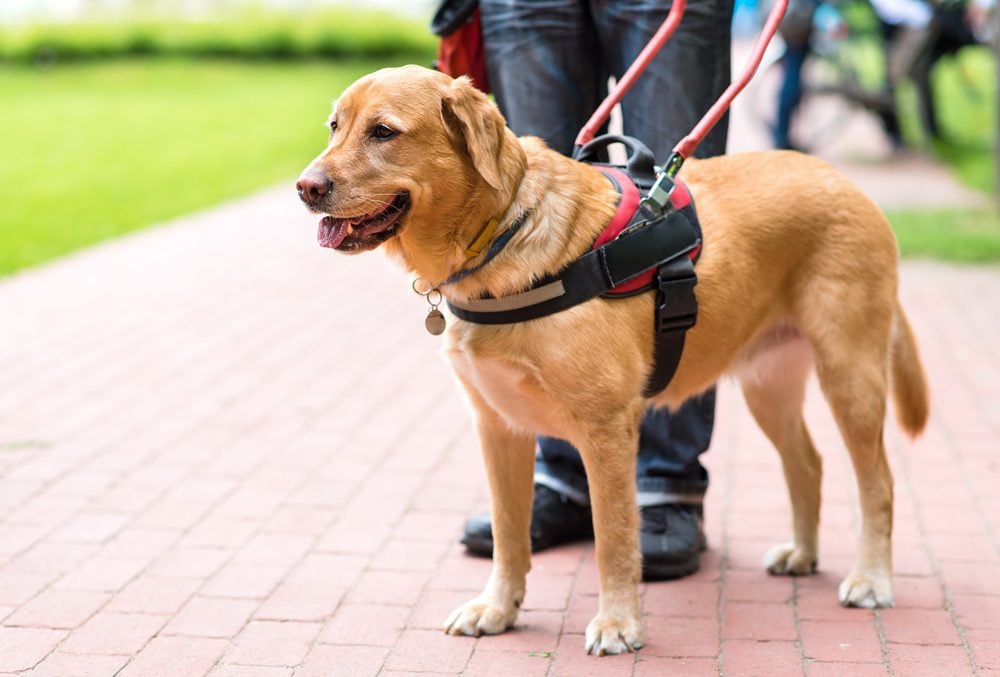


Labrador retrievers make great service dogs, and Labradors are one of the most popular breeds trained for guidance tasks, mobility support, or other service dog skills. Labrador retrievers are friendly and loving, and they get along well with both people and animals.
Retrievers do well with both physical and emotional tasks. They can grab things with their teeth gently, lead their handlers around outside or inside, and retrieve items on command. Labradors develop a strong bond with their handlers and love to have responsibilities.
Golden Retrievers
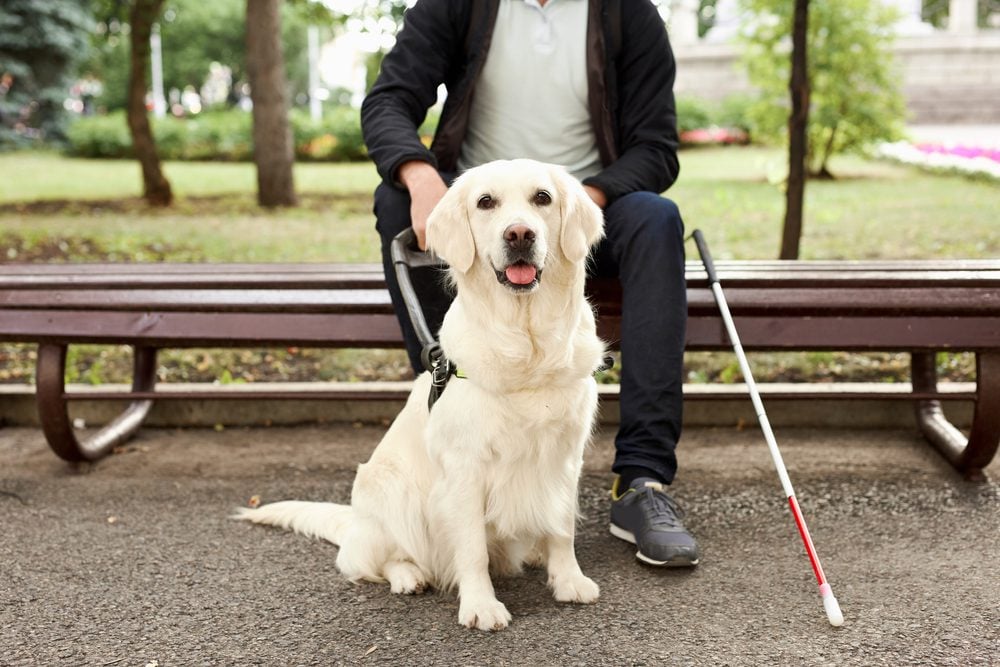


Similar to Labrador retrievers, golden retrievers are affectionate, eager to please, and love working with their owners day after day. This breed has the perfect size to act as a guide or mobility support dog and they are quite intelligent, leading them to be easily trained for a range of complex service dog tasks. And, because golden retrievers are quite loving and attentive, they easily provide support to those suffering from psychiatric or medical conditions.
German Shepherd
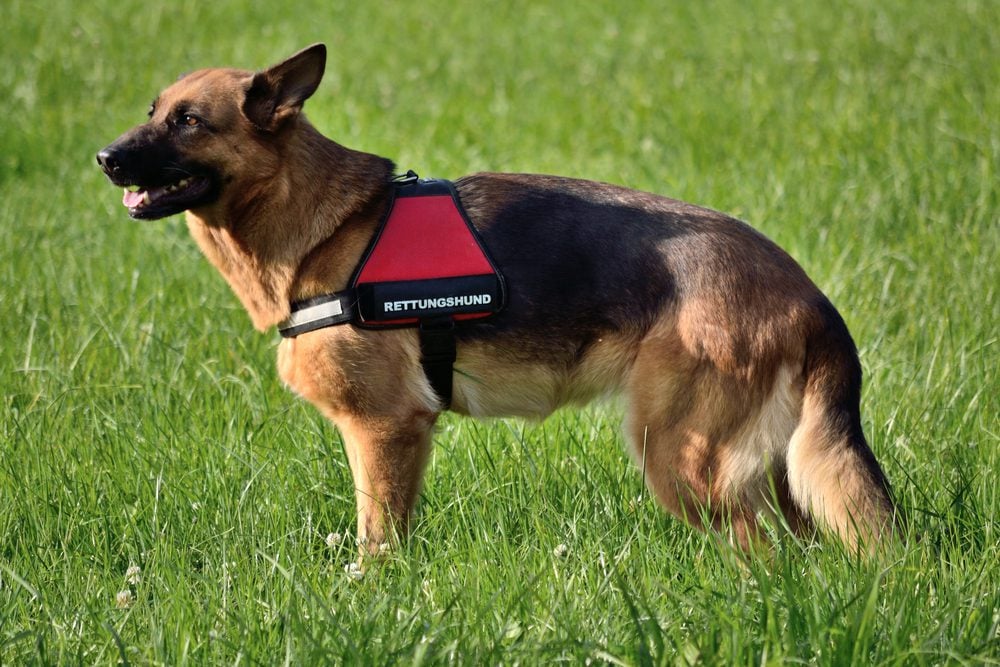


Large and physically strong, German shepherds are commonly known as working dogs, and they are a popular choice for police dogs due to their loyalty, love of working, and easily trainable nature. These qualities also make them excellent service dogs, and they are known to form strong bonds with their handlers.
Many German shepherds enjoy their working life, as it keeps them moving and gives them the satisfaction of pleasing their owners, and German shepherds are particularly talented with blood sugar monitoring because of their powerful sense of smell. Their large size is also great for mobility assistance, either serving as guide dogs or balance assistance dogs.
Poodle
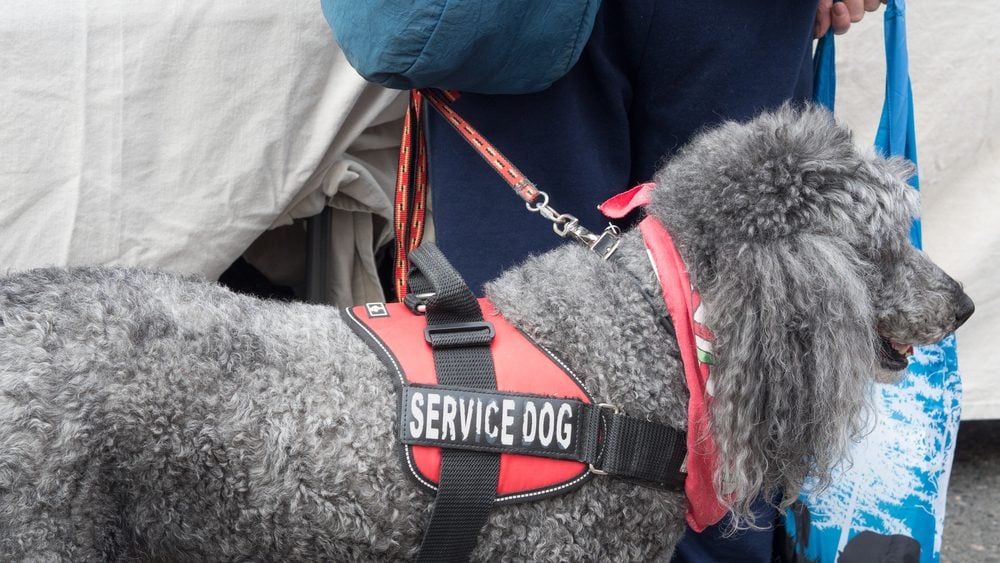


The best poodles for service work are full-size, standard poodles. These dogs are large enough to help with many physical tasks, and their high intelligence makes them well-suited for working and learning new things.
Poodles have a reputation for being easy to work with and easy to train. They love a challenge and enjoy completing tasks for their owners. Most poodles are passive dogs with a friendly nature. A unique benefit of owning a poodle as a service dog is its hypoallergenic fur; poodles don’t shed as much fur and dander as other breeds.
Pomeranian



While Pomeranians are very small dogs and are not the best suited for guidance or balance assistance, their size makes them great psychiatric service dogs or medical alert dogs. Most Pomeranians are very attentive to the needs of their owners, they are loving, and they can retrieve small items such as medication and cell phones, which makes them a perfect choice for those with certain psychiatric conditions.
Boxer
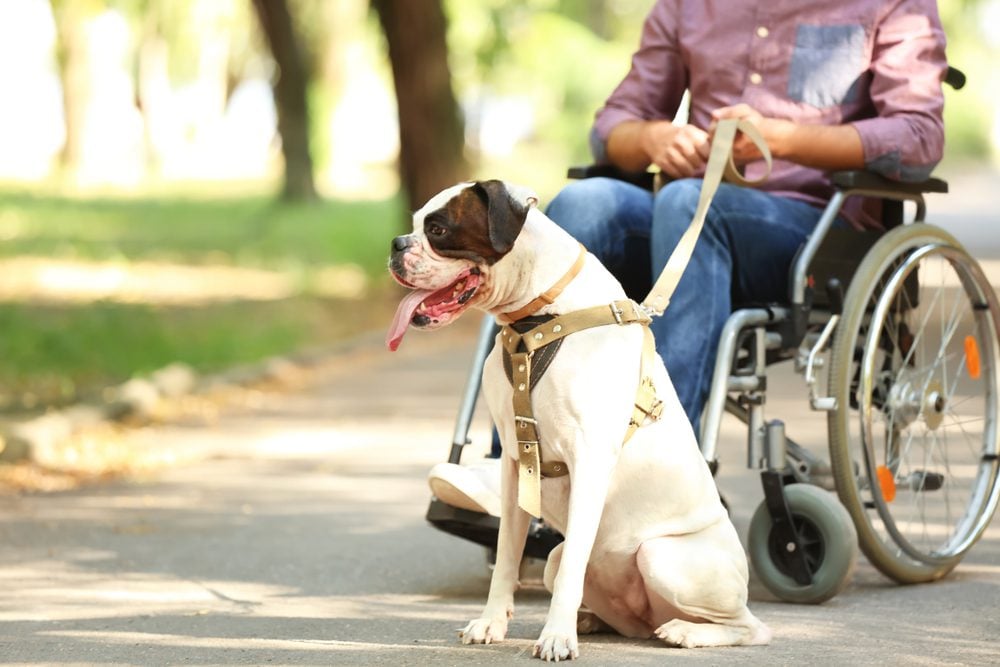


Boxers can make good service dogs for a variety of disabilities. They’re generally good-natured dogs that are friendly and gentle with all age ranges. Most boxers are comfortable in large and small groups and can be taught to navigate through a crowd.
With the intelligence to learn many tasks, especially tasks associated with working as a psychiatric service dog, boxers are a good choice for many individuals. Their friendly and patient nature means that they’re unlikely to become frustrated, and they can easily remain calm and stable in public or in a crowd.
It’s important to note that boxers do need quite a bit of exercise, and they have a lot of energy. You will need to make sure that you can take care of this dog’s exercise needs when they are not working so that they stay happy and healthy.
Border Collie
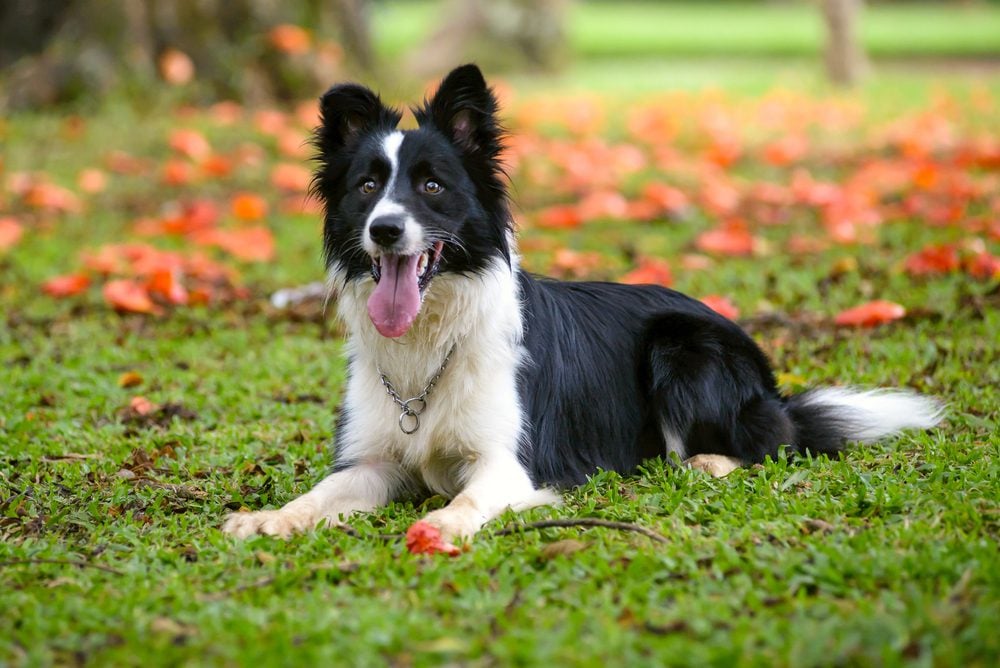


A popular choice for farm dogs around the world, border collies have been working alongside people for hundreds of years. They are one of the smartest dog breeds in the world, making them a great choice for handlers who need help with multiple complex tasks.
In general, border collies are good-natured dogs that do well with individuals or families. They have the appropriate size to act as guidance, balance, or mobility support dogs, and they are very intelligent, making them easily trained. Border collies may also pick up on your emotions or moods, and they are quite affectionate, which makes them well-suited for psychiatric service dog positions.
Border collies need work to stay happy and love learning new things. They do need a significant amount of mental stimulation and daily exercise to stay happy, so make sure you account for this before adopting one as a service dog.
Bernese Mountain Dog
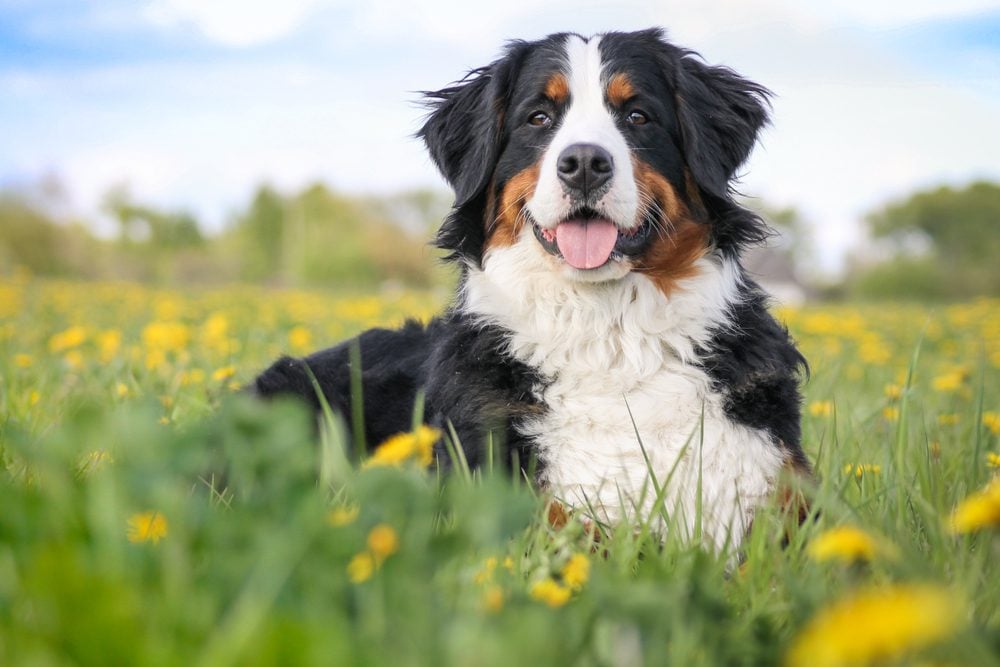


An elegant, dutiful, and gentle breed, Bernese mountain dogs are large animals that take well to service work. They are extremely friendly, love to please, and are physically strong enough to help their handlers with physical tasks. They are especially suited for guidance and mobility support work.
Because of their gentle demeanor, this breed is suited to working in public without becoming overwhelmed, and they won’t be distracted by loud spaces, children, or other dogs. Good for both those with physical disabilities and those in need of psychiatric service dogs or medical alert service dogs, Bernese mountain dogs are capable of learning complex tasks and love to work with their handlers.
Cavalier King Charles Spaniel
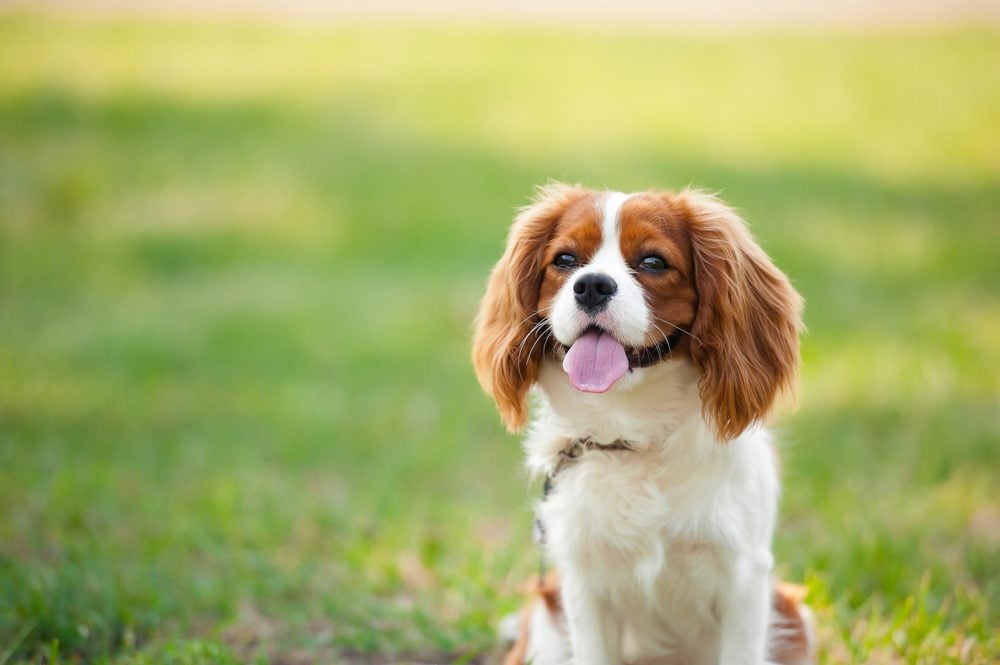


While cavalier King Charles spaniels are not necessarily the best choice for physical tasks, dogs of this breed tend to be very attentive to the emotional state and needs of their handlers. They’re commonly trained as psychiatric service dogs to help with PTSD, OCD, depression, and anxiety.
King Charles spaniels are lap dogs that tend to be strongly emotionally bonded to their handlers and enjoy being around them all the time. For psychiatric service dogs, this is a great quality, especially for those who need emotional support on top of their service dog’s normal tasks. As lap dogs with a low need for exercise, they’re not as demanding or high-energy as some of the larger breeds, which makes them suited to individuals that don’t have the ability to meet significant outdoor exercise or mental stimulation needs for their dog.
Traits to Look for in a Service Dog Breed
No matter which breed you choose as a service animal, the dog you choose to train should have the right traits for success. Some dogs are not suited to the challenging life of a service animal, and it’s important to understand that dogs that are reactive, anxious, or ill-behaved in public are not good service dog choices unless significant training is completed. Even then, some dogs are simply not the best choice for acting as a service dog.
The following traits are important to have in a service dog, as they ensure the animal will be happy working with their owner, can easily learn new tasks, and thrives as a service dog daily.
Intelligence
Being a service dog is complex, and each dog must master many multi-faceted tasks before being approved as a service dog. For your service animal to be successful, they will need to be able to learn and recall tasks. Not all dogs have the intelligence to learn and perform the necessary work and complex tasks, and some dogs have a stubborn streak by nature that makes training difficult.
There is an abundance of breeds that tend to be intelligent and individual dogs of nearly any breed may be intelligent enough to be a service dog. Make sure that when choosing a dog to adopt as a service animal, you select one that appears intelligent enough to keep up with strenuous service dog job requirements.
Temperament
Service dogs must accompany you to many public spaces, and they will find themselves in situations where there are large or loud crowds of people and other animals. Any service dog you have should be able to remain focused on their job while in these situations and not become distracted, scared, anxious, or aggressive when met by loud noises, distractions, or groups of people.
Service dogs should be confident, not afraid of people, non-reactive to certain situations, and easily trained to stay focused on their job when out and about in public.
Calm Dispositions
Calm, friendly dogs that aren’t overactive, too energetic, or easily stimulated by public environments are especially well-suited to service dog tasks. These pups must be able to remain composed and focus on their job of guiding their person, detecting medical situations, or completing other disability-related tasks regardless of the space that they are in.
Hyperactive and excitable dogs are not the best choice for service dogs, and you may not be able to train these pups to calm down enough to complete service dog tasks and remain focused while working—though this is very situation-dependent.
Reliability
Any service dog that you have must be well-trained and well-mannered enough to be reliable. You want to make sure that the nature of the dog you select to complete service tasks with you will remain focused on their job, understand commands, and respond appropriately every time. Dogs that struggle to consistently complete tasks, or those that have a stubborn streak and choose not to listen to commands are not the best choice for a service animal.
Attentive and Hard Working
Energy levels are important for a service dog. A service dog can’t be hyperactive, but also shouldn’t be lazy or unwilling to put in the work when you need it. Service dogs need the energy and attentiveness to do as much work as necessary without being difficult to control.
Along with the energy to perform their duties, service dogs need to be hardworking enough to direct their energy to accomplish the tasks you need completed. Not all dogs are willing to do the intense work required of service animals. Some have too much energy and get distracted from work too easily, while others are just unwilling to do the training or work every day. For this reason, a balance of these characteristics is necessary.
Willingness to Bond
Many dogs are loving and bond well with their handlers. However, some dogs are more individualistic and do not bond as well with humans. Your dog must be able to form a strong relationship with you so as to protect and help you. Some breeds are more social and better at bonding, while others are more aloof and prefer to do their own thing with the occasional company of their owners. A breed that has a reputation for forming strong connections with their owners is often a good choice for a service dog.
Eager to Please
Having a dog that loves to learn and is eager to please is essential for training an attentive, effective service dog. These traits make the dog easier to train overall and ensure that they enjoy completing tasks for their owner every day. Working breeds are often chosen as service dogs because of this, as they love to work and are genetically predisposed to wanting to learn new things and be mentally stimulated by completing tasks for their owners.
Hypoallergenic
Because service dogs are allowed to enter many public spaces and businesses, you may want to train a dog that won’t interfere with the health of others. They’ll also be in your home and near you often, so if you have allergies or are concerned about dog fur triggering health issues, a hypoallergenic dog such as a poodle might be a great option.
Dogs that shed excessively, drool, or have other unhygienic qualities might not be the best choice for a service dog, but this isn’t always a deal-breaker if the dog has all other essential qualities which make them well-suited to be a helpful, effective, and happy service animal.
Securing Your Service Dog
Service dogs are treasured animals. You’ve probably seen them out and about while they do their job assisting their handlers. There is no one breed that is unequivocally better or worse than another at being a service dog, and the ADA doesn’t have any service dog breed requirements, but all dogs have different traits and skill sets.
If you are considering adding a service dog to your life, adopt a dog that shows a willingness to learn, is happy to work alongside you every day, and has the size requirements you need to complete certain service dog tasks. Do this, and you will be sure to secure a service dog that helps you faithfully and enjoys the connection that you two deepen day after day.
